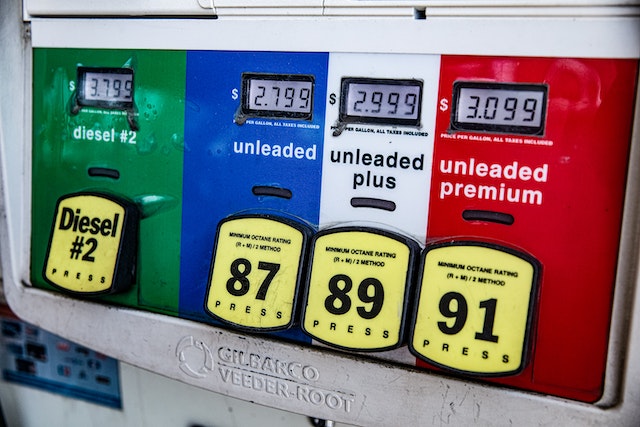
What is the difference between a petrol engine and a diesel engine? They use different fuel, they ignite the fuel in a different way, and a diesel engine is more efficient than a petrol engine.
Diesel and petrol are both made from crude oil. Crude oil is the petroleum that is taken out of the ground before it is refined. It is made up of a mix of hydrocarbons, but it also contains many impurities and particles that need to be removed before it can be used. This is the refining process. Oil is refined by using its boiling point. When the oil enters the refinery, it passes over a furnace, and it is heated. The different types of oil separate out due to their density and their boiling point. Gases are the least dense and they vaporize at about 30 °C. Gasoline is the next layer and it boils at between 30 and 85 °C. Kerosene and jet fuel lie in the middle. They boil at 170 to 230 °C. Diesel is next and boils at 230 to 340 °C. The temperature of the crude oil is gradually increased, and each different type of oil is piped off as it evaporates.
Diesel has a higher boiling point than gasoline because it has longer chains of carbon atoms in it. Gasoline is made of chains of between 4 to 12 carbon atoms. Diesel is made of chains of between 12 and 20 carbon atoms. When a liquid boils, its atoms receive thermal energy and move more, eventually turning to a gas. The more atoms something has, the more dense it will be, and the less the atoms are free to move. That means it takes more energy to get them to turn to a gas and the liquid has a higher boiling point.
So, how does a gasoline engine work? A gasoline engine is an internal combustion engine. It consists of fixed cylinders with pistons that are free to move. There are two valves leading into the cylinder. One of the valves lets in fuel and air, the other valve lets out gases. When the engine is started, a mix of air and gasoline is injected into the cylinder through the valve, which closes behind it. The piston is attached to a crankshaft and the motion of the crankshaft pushes the piston up, compressing the air and gasoline mixture. A spark plug at the top of the cylinder sparks and ignites the air and fuel mixture. The gasoline burns and rapidly expands by about 8 times its original size. This rapid expansion pushes down the piston, turning the crankshaft. The second valve opens, and the gas is released before the process repeats.
A gasoline powered internal combustion engine is very inefficient. Even the best engines can only be 28% efficient. Over 70% of the energy released from the gasoline goes out of the exhaust pipe of the car. The problem is that the steel engine can’t be heated high enough to make use of all of the energy without melting. It would require a ceramic engine to be more efficient, and that is not yet possible. Another problem is that not all of the fuel is combusted.
How does a diesel engine work? The concept is the same, but the practice is a little different. A diesel engine also has fixed cylinders with movable pistons. The piston is also attached to a crankshaft and when the piston is at the bottom of its cycle, air is injected into the cylinder. The piston then moves up and compresses the air, making it hotter. When the air is compressed, the molecules move more and collide with each other much more frequently, producing heat. The compressed air reaches 538 °C. When the air is at its most compressed, diesel fuel is injected into the cylinder. The air is so hot that the diesel instantly combusts, rapidly increasing in volume and pushing the piston down, turning the crankshaft.
Diesel engines are far more efficient than gasoline engines. They can reach efficiencies of 60%. This is because there is more energy in diesel fuel than there is in gasoline. The diesel has longer chains of carbon atoms, which means it is denser and has more energy than the same volume of gasoline. That means it takes less fuel to get the same amount of power from a diesel engine.
Diesel engines can produce more power for less fuel than gasoline engines, so they are quite often used with heavy vehicles, such as trucks and buses. They use less fuel so they produce less CO2. However, they can be more expensive to buy and maintain, although this balances out when the fuel efficiency is considered.
Both petrol engines and diesel engines have advantages and disadvantages, but neither of them is perfect. Hydrogen engines or electric cars might be the way of the future. And this is what I learned today.
Sources
https://energyeducation.ca/encyclopedia/Internal_combustion_engine
https://www.vedantu.com/chemistry/difference-between-petrol-and-diesel-engine
https://byjus.com/chemistry/difference-between-diesel-and-petrol-engine/
https://www.tutorialspoint.com/difference-between-petrol-engine-and-diesel-engine
https://en.wikipedia.org/wiki/Otto_cycle
https://www.acea.auto/fact/differences-between-diesel-and-petrol/
https://education.nationalgeographic.org/resource/petroleum/
https://www.iea-amf.org/content/fuel_information/diesel_gasoline/
